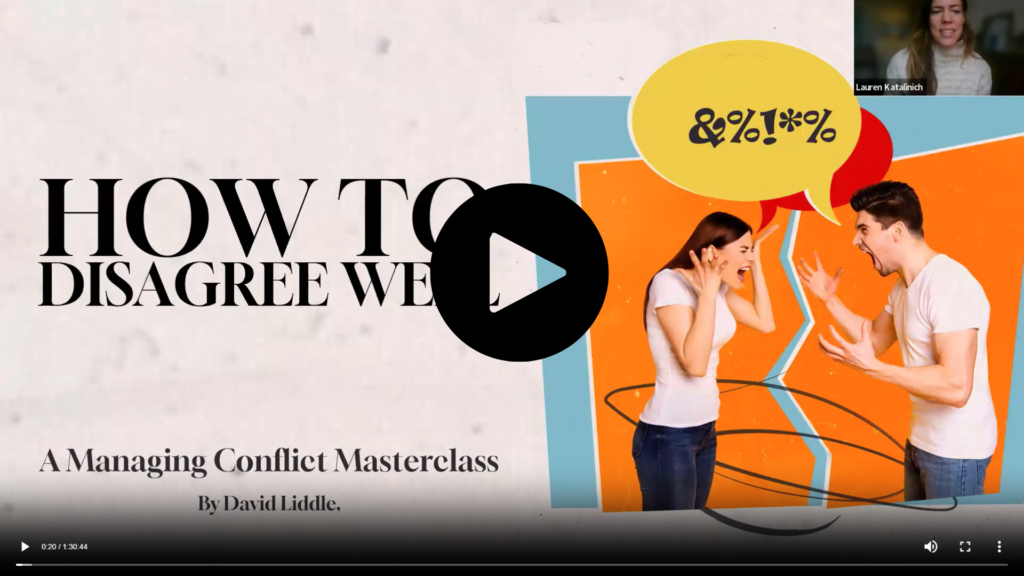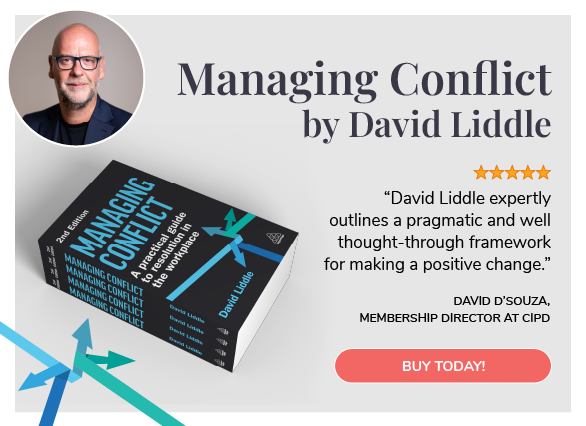
Share article:
Tags:
In last week’s masterclass, How to Disagree Well, our CEO David Liddle revealed a stark truth about workplace conflict: we’re doing it all wrong. In a session that drew unprecedented attendance, David challenged our traditional approaches to workplace disagreements and offered a compelling alternative that promises to transform how organisations handle conflict.
The Current State of Conflict
“People tell me they go to bed thinking about this stuff,” David shared early in the session. “They wake up in the middle of the night thinking about it. The first thing they think about in the morning – it’s like a brain worm in their head.” This resonated deeply with attendees, many of whom shared their own experiences of workplace conflict taking a severe toll on their wellbeing.
The problem, as David explained, is that organisations typically respond to conflict in one of two ways: they either avoid it entirely (what he terms “extensive inaction”) or they overreact with formal procedures (“expensive overreaction”). Neither approach actually resolves the underlying issues, and often makes situations worse.
To illustrate this, David shared a powerful case study about two employees – one who became the other’s manager after a promotion. What started as disappointment over a missed opportunity escalated into formal grievances and potential dismissal, all because no one created space for genuine dialogue early in the process.
The Human Element
What this approach unique is the emphasis on understanding conflict through three dimensions: head, heart, and gut. While traditional conflict resolution focuses almost exclusively on rational, procedural approaches (the head), David argues that we need to engage with the emotional components (heart) and instinctive reactions (gut) to achieve real resolution.
“We’ve systematically designed humanity out of our processes,” he observed, pointing to standard grievance procedures that prioritize organizational protection over actual resolution. The irony, as he noted, is that some of the most effective conflict resolution happens informally – over what he calls “a coffee and a muffin” – when people have the opportunity to really listen to each other.
A New Approach
The heart of the session focused on seven key tools for better conflict resolution, but these aren’t just technical fixes:
- Create Safe Spaces: Establish ground rules that promote respect and psychological safety. People need to feel secure before they can engage in honest dialogue.
- Listen Deeply: Not just to words, but to the underlying needs and emotions. As one participant shared, “Sometimes being truly heard is all we really need.”
- Suspend Judgment: Your role isn’t to decide who’s right or wrong, but to understand each perspective and help find common ground.
- Practice Empathy: Try to understand others’ experiences, even if you don’t agree with their conclusions.
- Reframe the Conversation: Move from positions (“I want this!”) to interests (“I need to feel valued”).
- Seek Win-Win Solutions: There’s almost always a “zone of possible agreement” (ZOPA) if we look hard enough.
- Focus on the Future: Instead of dwelling on past grievances, ask “What do we need to work well together going forward?”
Perhaps the most powerful tool discussed was active listening. “Do you know what people tell me after mediation?” David asked. “‘You’re the first person who’s really listened to me.’ This is after six years of conflict! That’s heartbreaking.”
The session explored how to move beyond positions (“I want this!”) to underlying interests (“I need to feel valued”), and how to find what David calls the “Zone of Possible Agreement” (ZOPA). He insists there’s always a ZOPA between human beings – we just need the right tools and mindset to find it.
The Resolution Framework
In the final portion of the masterclass, we introduced our alternative to traditional grievance procedures: the The Resolution Framework™. Already implemented by organisations like Aviva, Royal Mail, and the BBC, this framework emphasises early intervention, multiple resolution paths, and a focus on dialogue over procedure.
The results are impressive. Aviva saw a 60% reduction in formal cases within six months. Royal Mail achieved £65 million in annual savings. But perhaps more importantly, organisations report healthier workplace cultures where differences can be discussed openly and productively.
Looking Forward
As the session drew to a close, David challenged attendees to rethink their entire approach to workplace conflict. “We are not required to do dispute resolution tomorrow in the same way that we did it yesterday,” he insisted. He encouraged everyone to identify one thing they’ll stop doing, one new approach they’ll try, and one effective practice they’ll continue.
The energy in the virtual room was palpable as attendees shared their takeaways in the chat. Many expressed relief at finding an alternative to traditional grievance procedures, while others appreciated the practical tools they could implement immediately.
For those interested in diving deeper, we have made The Resolution Framework™ freely available, along with assessment tools and implementation support. But this core message doesn’t require any special resources: start with dialogue, prioritise understanding over procedure, and remember that culture changes one conversation at a time.
As workplaces become more diverse and complex, the ability to disagree well isn’t just a nice-to-have – it’s essential for organisational success.
Visit here for more information on the The Resolution Framework™ and watch the full Masterclass









